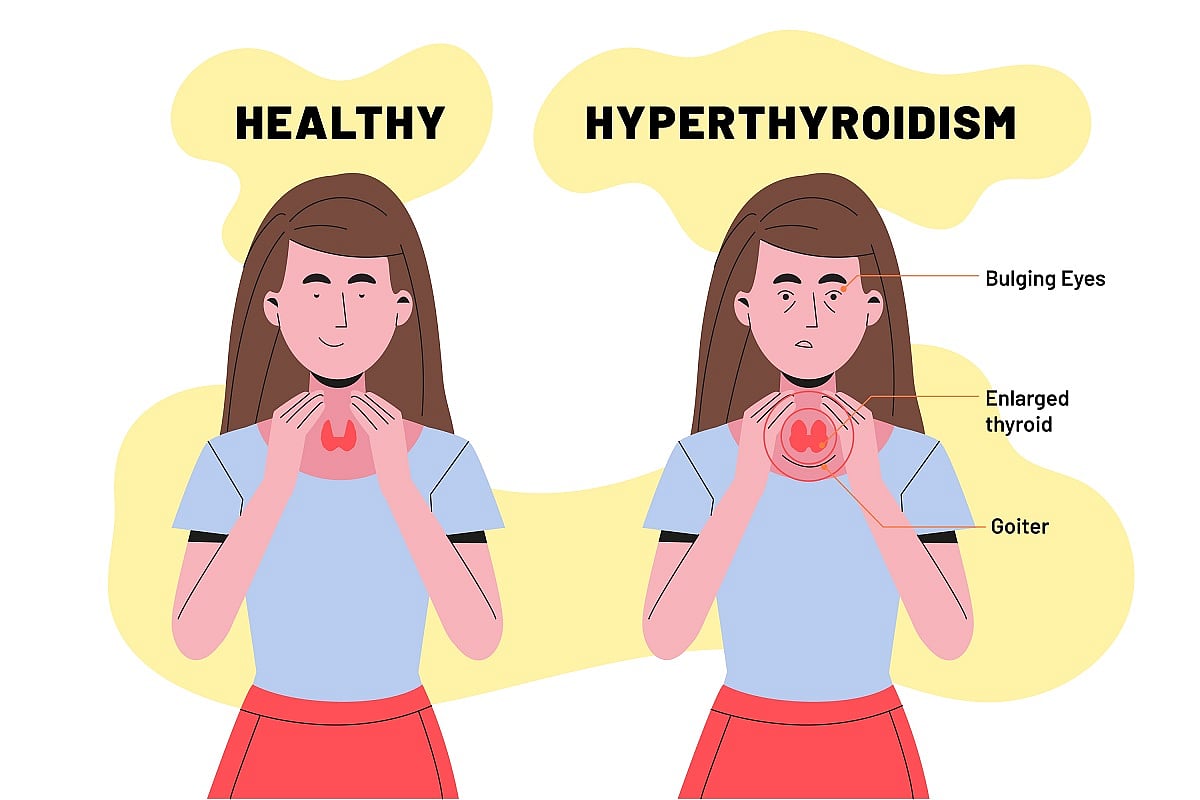Hyperthyroidism is characterised by high levels of two thyroid hormones called serum thyroxine and tri-iodothyronine, and low levels of thyroid-stimulating hormone (TSH). Unlike hypothyroidism, hyperthyroidism is not so common and can be a cause of concern if not dealt with properly.
What can cause hyperthyroidism
Hyperthyroidism is caused due to over active thyroid gland. This occurs when the thyroid gland produces excessive hormones. Our immune system, at times, can attack the gland causing excessive hormone secretion and a serious imbalance. This condition is called Graves’ disease.
How can it be diagnosed
A TSH antibody (TSHR-Ab) test, called Thyroid-Stimulating Immunoglobulin Test, is used to identify hyperthyroidism or Graves’ disease.
Common symptoms of this disorder
Sweating
Weight loss
Change in appetite
Thyroid enlargement known as Goiter
Tremors
Muscle weakness
Sleep disturbance
Mental disturbance
Red, dry, swollen, puffy and bulging eyes
Infertility
What can trigger hyperthyroidism
It is generally seen in patients who have a family history of an autoimmune disorder. Other reasons could be infection (caused by Yersinia enterocolitica), excessive iodine intake, stress, steroids, and toxins. Smoking has a negative impact, particularly on the eye triggered by hyperthyroidism.
Treatment
Anti-iodine medications
Surgery — partial or complete removal of the gland
Radioactive iodine
Dietary recommendation
Weight loss is very common in hyperthyroidism, hence a high-calorie nutritious meal plan will help maintain the ideal weight. Always follow a balanced eating pattern with the correct proportion of carbohydrates, protein, fat and micronutrients. Include rice, pasta, jowar, bajra, homemade bread, and sago. Here’s how you can manage hyperthyroidism through diet:
Low iodine intake in food: Foods rich in iodine like iodised salt, fish, sea vegetables, shellfish, cheese, egg yolk, processed foods, frozen and deli meats should be avoided. Instead consume foods low in iodine like fruits, vegetables, chicken, beef, pork, iodine-free salt, unsalted nuts, root vegetables, egg white, honey, maple syrup, jam and jelly.
Thyroid suppressing foods: Consuming foods like cabbage, cauliflower, soya, broccoli, Brussels sprouts, mustard seed, turnip, radish, bamboo shoot, kale and cassava (tapioca root) will help keep T3, T4 and TSH under normal levels.
Vitamin-rich foods: Vitamin B12 deficiency can also be a reason for hyperthyroidism. Include B12-rich foods like chicken, liver and egg white. B12 is also generated in the gut by certain friendly micro-organisms. However, screening of this nutrient is advisable and corrective measures can be taken with the help of supplements if required.
Home-cooked nutritious meals: While you might want to order your favourite biryani or pizza, restaurant food is not advisable for hyperthyroid patients. Several seasoning, sauces, dips and spreads used by restaurants can be high in iodine and can interfere with thyroid medication.
Selenium supplementation: This is effective only in case of mild eye problems caused by Graves’ Disorder. These supplements should be taken under the guidance of a qualified medical expert or dietitian.
Pulses, fruits and veggies: Vegetables including roots like potato, sweet potato, and yam can be eaten liberally in hyperthyroidism. Fruits and fruit juices, jam, jellies, and homemade marmalades can add extra calories to your diet along with a good supply of nutrients.
Unsalted nuts and dried fruits except for Brazil nuts and prunes can help in weight gain. Unsalted oilseeds like flax seeds, pumpkin seeds, and sunflower seeds are sources of good fat. Include a teaspoon of these mixed seeds in your daily diet to get a daily boost of micronutrients.
Have a bowl full of dal/ pulses/ lentils in every meal to ensure you meet your daily protein requirement. You can also include moong, matki, and rajma. Soak them in water before use as they contain phytates that can interfere with nutrient absorption.
Things to keep in mind
Consider the above recommendation as a guideline meant to be followed for a lifetime and not just as a diet plan meant for a short period.
Calcium, iron and multivitamin supplements interfere with thyroid medication. Speak to your endocrinologist or a qualified dietitian who can chart out the right supplement dosage and correct timing so that these nutrients can be best absorbed by your body.
Hyperthyroidism can also cause anxiety, irritability, and restlessness. Though antithyroid medications will help reduce these symptoms, coping mechanisms like meditation, exercise, and counselling work best to attain stability in your thoughts.
[Sucheta Shriyan is PG (Dietetics and Applied Nutrition); MSc (Dietetics)]








